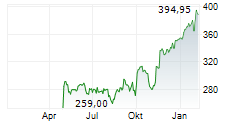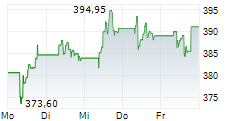- Giredestrant plus everolimus reduced the risk of disease progression or death by 44% and 62% in ITT and ESR1-mutated populations, respectively, in a post-CDK inhibitor setting, compared with standard-of-care endocrine therapy plus everolimus1
- The giredestrant combination was well tolerated; no new safety signals were observed including no photopsia1
- Overall survival data were immature, but a clear positive trend was seen in both the ITT and ESR1-mutated populations1
- If approved, giredestrant plus everolimus could be the first and only oral selective oestrogen receptor degrader combination in the post-CDK inhibitor setting
Basel, 18 October 2025 - Roche (SIX: RO, ROG; OTCQX: RHHBY) announced today positive results from the phase III evERA Breast Cancer study. Data showed giredestrant in combination with everolimus significantly reduced the risk of disease progression or death (progression-free survival; PFS) by 44% and 62% in the intention-to-treat (ITT) and ESR1-mutated populations, respectively, compared with standard-of-care endocrine therapy plus everolimus.1 The evERA study is evaluating the investigational giredestrant combination in people with oestrogen receptor (ER)-positive, human epidermal growth factor receptor 2 (HER2)-negative, locally advanced or metastatic breast cancer previously treated with cyclin-dependent kinase (CDK) 4/6 inhibitor and endocrine therapy.2 This is the first positive head-to-head phase III trial investigating a selective oestrogen receptor degrader-containing regimen versus a standard-of-care combination.2 The results are being presented in an oral session at the European Society for Medical Oncology Congress 2025. Data will be shared with health authorities, with the aim of bringing this potential treatment option to people as soon as possible.
"A particularly high unmet need remains for people who become resistant to endocrine therapies and CDK inhibitors. These study results support the potential for the giredestrant combination to become a new standard-of-care for all patients in this setting," said Levi Garraway, MD, PhD, Roche's Chief Medical Officer and Head of Global Product Development.
"Resistance to standard-of-care therapies is common in the post-CDK inhibitor setting, and the results from evERA validate using a combination to address this challenge," said Dr Erica L. Mayer, Medical Oncologist at Dana-Farber Cancer Institute. "The clinically meaningful benefit observed with the giredestrant and everolimus all-oral combination is impressive and speaks to its potential to improve outcomes for patients in need of new treatment options."
The giredestrant combination demonstrated a statistically significant and clinically meaningful improvement in PFS compared with standard-of-care endocrine therapy plus everolimus.1 In the ITT population, the median PFS was 8.77 months compared with 5.49 months in the giredestrant and comparator arms, respectively (stratified hazard ratio [HR]=0.56; 95% CI: 0.44-0.71, p-value= <0.0001).1 In the ESR1-mutated population, the median PFS was 9.99 months compared with 5.45 months in the giredestrant and comparator arms, respectively (HR=0.38; 95% CI: 0.27-0.54, p-value= <0.0001).1 The PFS benefit was consistent across pre-specified subgroups in both populations.1 Overall survival (OS) data were immature at the time of analysis, but a clear positive trend has been observed in the ITT (HR=0.69, 95% CI: 0.47-1.00, p-value=0.0473) and ESR1-mutated populations (HR=0.62, 95% CI: 0.38-1.02, p-value=0.0566).1 Follow-up for OS will continue to next analysis. Giredestrant in combination with everolimus also demonstrated improvements in key secondary endpoints (objective response rate and duration of response) compared with the comparator arm across both patient populations.1
Adverse events for the giredestrant-based combination were manageable and consistent with the known safety profiles of the individual medicines.1 No new safety signals were observed, including no photopsia.1
ER-positive breast cancer accounts for approximately 70% of breast cancer cases.3 Resistance to endocrine therapies, particularly in the post-CDK inhibitor setting, increases the risk of disease progression and is associated with poor outcomes.3,4 All-oral combination therapies, such as giredestrant plus everolimus, could address this by targeting two different signalling pathways while helping to minimise the impact of treatment on people's lives without the need for injections.5,6
Our extensive giredestrant clinical development programme spans multiple treatment settings and lines of therapy, reflecting our commitment to deliver innovative medicines to as many people with ER-positive breast cancer as possible.
About the evERA Breast Cancer study
evERA Breast Cancer [NCT05306340] is a phase III, randomised, open-label, multicentre study evaluating the efficacy and safety of giredestrant in combination with everolimus versus standard-of-care endocrine therapy in combination with everolimus in people with oestrogen receptor-positive, human epidermal growth factor receptor 2-negative locally advanced or metastatic breast cancer who have had previous treatment with cyclin-dependent kinase 4/6 inhibitor and endocrine therapy, either in the adjuvant or locally advanced/metastatic setting.2
The co-primary endpoints are investigator-assessed progression-free survival in the intention-to-treat and ESR1-mutated populations, defined as the time from randomisation to the time when the disease progresses or a patient dies from any cause.2 The trial has been enriched for ESR1-mutated patients above the natural prevalence to assess the efficacy in this population. In the post-CDK inhibitor setting, up to 40% of people with ER-positive disease have ESR1 mutations.7,8 Key secondary endpoints include overall survival, objective response rate, duration of response, clinical benefit rate and safety.2
About giredestrant
Giredestrant is an investigational, oral, next-generation selective oestrogen receptor degrader and full antagonist.9
Giredestrant is designed to block oestrogen from binding to the oestrogen receptor, triggering its breakdown (known as degradation) and stopping or slowing down the growth of cancer cells.10
Giredestrant has an extensive clinical development programme and is being investigated in five company-sponsored phase III clinical trials that span multiple treatment settings and lines of therapy to benefit as many people as possible:
- Giredestrant versus standard-of-care endocrine therapy (SoC ET) as adjuvant treatment in ER-positive, human epidermal growth factor receptor 2 (HER2)-negative early-stage breast cancer (lidERA Breast Cancer; NCT04961996 (https://clinicaltrials.gov/study/NCT04961996?cond=Breast%20Cancer&intr=Giredestrant&term=lidera&rank=1))11
- Giredestrant plus everolimus versus SoC ET plus everolimus in ER-positive, HER2-negative, locally advanced or metastatic breast cancer (evERA Breast Cancer; NCT05306340 (https://clinicaltrials.gov/study/NCT05306340))2
- Giredestrant plus palbociclib versus letrozole plus palbociclib in ER-positive, HER2-negative, endocrine-sensitive, recurrent locally advanced or metastatic breast cancer (persevERA Breast Cancer; NCT04546009 (https://clinicaltrials.gov/study/NCT04546009?cond=Breast%20Cancer&intr=Giredestrant&term=persevera&rank=1))12
- Giredestrant plus investigator's choice of a cyclin-dependent kinase 4/6 (CDK4/6) inhibitor versus fulvestrant plus a CDK4/6 inhibitor in ER-positive, HER2-negative advanced breast cancer resistant to adjuvant endocrine therapy (pionERA Breast Cancer; NCT06065748 (https://clinicaltrials.gov/study/NCT06065748?cond=Breast%20Cancer&intr=Giredestrant&term=pionera&rank=1))13
- Giredestrant plus Phesgo® (pertuzumab, trastuzumab, and hyaluronidase subcutaneous) versus Phesgo in ER-positive, HER2-positive locally advanced or metastatic breast cancer (heredERA Breast Cancer; NCT05296798 (https://clinicaltrials.gov/study/NCT05296798?cond=Breast%20Cancer&intr=Giredestrant&term=heredera&rank=1))14
About oestrogen receptor (ER)-positive breast cancer
Globally, the burden of breast cancer continues to grow, with 2.3 million women diagnosed and 670,000 dying from the disease every year.15 Breast cancer remains the number one cause of cancer-related deaths amongst women, and the second most common cancer type.16
ER-positive breast cancer accounts for approximately 70% of breast cancer cases.3 A defining feature of ER-positive breast cancer is that its tumour cells have receptors that attach to oestrogen, which can contribute to tumour growth.17
Despite treatment advances, ER-positive breast cancer remains particularly challenging to treat due to its biological complexity.5 Patients often face the risk of disease progression, treatment side effects and resistance to endocrine therapy.5,18 There is an urgent need for more effective treatments that can delay clinical progression and reduce the burden of treatment on people's lives. 5,18
About Roche in breast cancer
Roche has been advancing breast cancer research for more than 30 years, and it continues to be a major focus of research and development. Our legacy began with the development of the first targeted therapy for human epidermal growth factor receptor 2-positive breast cancer, and we continue to push the boundaries of science to address the complexities of all breast cancer subtypes.
By leveraging our dual expertise in pharmaceuticals and diagnostics, we are dedicated to providing tailored treatment approaches and improving outcomes for every patient, from early to advanced stages of the disease. Together with our partners, we are relentlessly pursuing a cure, as we strive for a future where no one dies from breast cancer.
About Roche
Founded in 1896 in Basel, Switzerland, as one of the first industrial manufacturers of branded medicines, Roche has grown into the world's largest biotechnology company and the global leader in in-vitro diagnostics. The company pursues scientific excellence to discover and develop medicines and diagnostics for improving and saving the lives of people around the world. We are a pioneer in personalised healthcare and want to further transform how healthcare is delivered to have an even greater impact. To provide the best care for each person we partner with many stakeholders and combine our strengths in Diagnostics and Pharma with data insights from the clinical practice.
For over 125 years, sustainability has been an integral part of Roche's business. As a science-driven company, our greatest contribution to society is developing innovative medicines and diagnostics that help people live healthier lives. Roche is committed to the Science Based Targets initiative and the Sustainable Markets Initiative to achieve net zero by 2045.
Genentech, in the United States, is a wholly owned member of the Roche Group. Roche is the majority shareholder in Chugai Pharmaceutical, Japan.
For more information, please visit www.roche.com.
All trademarks used or mentioned in this release are protected by law.
References
[1] Mayer E, et al. Giredestrant.
[3] Kinslow C, et al. Prevalence of Estrogen Receptor Alpha.
[12] ClinicalTrials.gov. A Study Evaluating the Efficacy and Safety of Giredestrant Combined With Palbociclib Compared With Letrozole Combined With Palbociclib in Participants With Estrogen Receptor-Positive, HER2-Negative Locally Advanced or Metastatic Breast Cancer.
[13] ClinicalTrials.gov. A Study to Evaluate Efficacy and Safety of Giredestrant Compared With Fulvestrant.
[14] ClinicalTrials.gov. A Study to Evaluate the Efficacy and Safety of Giredestrant in Combination With Phesgo.
[15] World Health Organisation. Breast Cancer [Internet; cited 2025 October]. Available from: https://www.who.int/news-room/fact-sheets/detail/breast-cancer.
[16] World Health Organization. Cancer Today [Internet; cited 2025 October]. Available from: https://gco.iarc.fr/today/en/dataviz/bars?mode=cancer&types=1&group_populations=1&sexes=2&key=asr&age_end=14.
[17] National Cancer Institute. Hormone Therapy for Breast Cancer [Internet; cited 2025 October]. Available from: https://www.cancer.gov/types/breast/breast-hormone-therapy-fact-sheet.
[18] Basaran G, et al. Ongoing unmet needs in treating estrogen receptor-positive/HER2-negative metastatic breast cancer. Cancer Treat Rev. 2018 Feb;63:144-55.
Roche Global Media Relations
Phone: +41 61 688 8888 / e-mail: media.relations@roche.com
| Hans Trees, PhD Phone: +41 79 407 72 58 | Sileia Urech Phone: +41 79 935 81 48 |
| Nathalie Altermatt Phone: +41 79 771 05 25 | Lorena Corfas Phone: +41 79 568 24 95 |
| Simon Goldsborough Phone: +44 797 32 72 915 | Karsten Kleine Phone: +41 79 461 86 83 |
| Kirti Pandey Phone: +49 172 6367262 | Yvette Petillon Phone: +41 79 961 92 50 |
| Dr Rebekka Schnell Phone: +41 79 205 27 03 |
Roche Investor Relations
| Dr Bruno Eschli Phone: +41 61 68-75284 e-mail: bruno.eschli@roche.com | Dr Sabine Borngräber Phone: +41 61 68-88027 e-mail: sabine.borngraeber@roche.com |
| Dr Birgit Masjost Phone: +41 61 68-84814 e-mail: birgit.masjost@roche.com |
Investor Relations North America
Loren Kalm
Phone: +1 650 225 3217
e-mail: kalm.loren@gene.com
Attachment
- Media & Investor Release evERA ESMO (https://ml-eu.globenewswire.com/Resource/Download/21995efb-8dea-45e0-a2a6-59e3d850d8dc)




